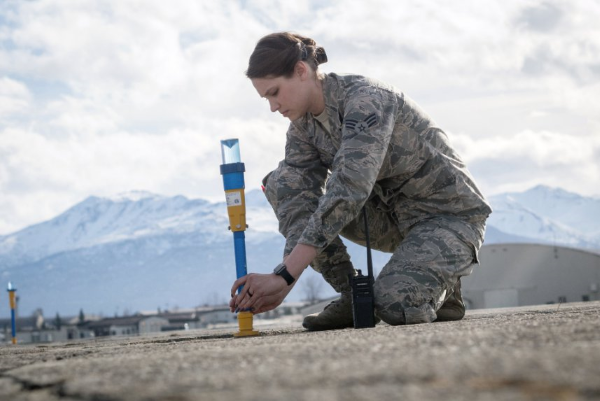Air Force Airfield Management Specialists are key to successful operations of any United States Air Force base regardless of whether the base is in the states or halfway around the world.
It is these airmen who make sure that runways are clear, pilots have the information that they need, and are ultimately responsible that all aircraft can take off and land successfully.
It matters not what the weather is — be it ice, snow, rain, sleet, cloudy or sunny. Night or day is of no consequence, either.
The Airfield Management Specialist must make sure that their airfield is ready for anything and everything.
If the takeoff or landing is unscheduled or short notice, they have to be ready.
The Airfield Management Specialist job is categorized as Air Force Specialty Code (AFSC) 1C7X1.
Jump To A Section
Requirements and Qualifications
To become an Airfield Management Specialist in the United States Air Force, there are specific requirements and qualifications one must meet, which include:
- High school diploma, GED with 15 college credits, or GED
- United States Citizen
- Ability to speak distinctly in person and over air-to-ground radios
- ASVAB score of at least General: 50, Mechanical: 40
- Must be between the ages of 17 and 39
- Completion of 8.5 weeks of Basic Miltary Training
- Completion of a current National Agency Check, Local Agency Checks, and Credit Check
- Possession of a valid state driver’s license to operate government motor vehicles
- Normal color vision (not colorblind)
- Must be eligible for a Secret security clearance
Related Article – Air Force Grooming Standards: Haircuts, Mustaches, Beards, And More
Training and Career Path
Prior to becoming an Air Force Airfield Management Specialist, you must successfully complete the Air Force Basic Military Training course, commonly referred to as Boot Camp.
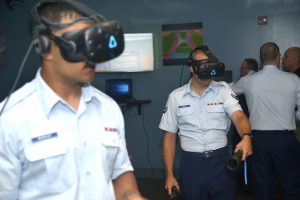
Prior to Boot Camp, it is highly recommended that Air Force enlistees are physically prepared for the rigors of Boot Camp and military life. To aid in that effort, the Air Force provides an easy-to-follow 21 Day Fitness Program for all Air Force candidates.
Air Force Basic Military Training
All airmen must attend Basic Military Training (BMT) at Joint Base San Antonio (JBSA) Lackland in San Antonio, Texas.
Related Article – How Hard Is Air Force Basic Training?
Air Force Basic Military Training is eight and a half weeks in duration. However, recruits enrolled in the Delayed Entry Program (DEP) gain an edge in preparing for Air Force Boot Camp by learning many of the military fundamentals with their Air Force recruiters.
Most recruiters also work with the fledgling recruits on preparing for the physical rigors they will encounter in Air Force Basic Military Training.
The Air Force segments into weeks, from Zero Week to Week 8. Recruits, over time, have given each week a special nickname that best describes the week.
For example, Week One is commonly referred to as ‘Sneaker Week’ since recruits are not yet issued boots, and must wear tennis shoes with their uniforms instead.
Week 6 is known as BEAST week for Basic Expeditionary Application Skills Training Week.
During BEAST Week, recruits prepare for mock deployment, live in tents, eat Meals Ready to Eat (MREs) and train for current combat environments.
Skills and fundamentals taught during the rigorous eight and a half weeks during Air Force Basic Military Training include a multitude of topics and skills too numerous to mention here. However, a few include:
- Physical Conditioning
- Basic Marching and Drill Movements
- Weapons Cleaning
- Law of Armed Conflict
- Flight Formation
- CPR Certification
- Code of Conduct
- M9 (9MM) Pistol Training
- Air Force History and Organization
- Ethics
Please note that this list is but a basic overview of the skill taught during Basic Military Training and is not all-inclusive.
More detailed information about Air Force Basic Military Training is available here.
After Basic Military Training, the real work begins for soon-to-be Air Force Airfield Management Specialists.
Air Force Airfield Management Technical Training
Air Force BMT graduates attend training at Keesler Air Force Base in Biloxi, Mississippi.
The technical training is thirty days long and is run by the 334th Training Squadron (TRS).
Training consists of the completion of both a basic airfield management course and an advanced airfield management course.
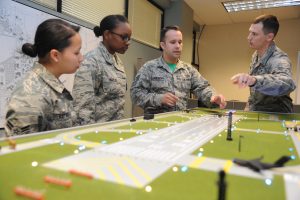
Airman will get experience in:
- NOTAM (Notice to Airmen) processing
- Flight data processing
- Emergency response actions
- Maintaining flight information data and supportive displays.
The Airfield Management Apprentice Course also provides experience in both supervising or performing duties such as airfield surveys of non-Department of Defense airfield for use by Air Force aircraft, coordination of airfield construction and/or repairs, airfield inspections, and processing airfield waivers.
After graduation, students will be USAF Enlisted Airman with credits earned towards Aviation Management.
They will be authorized to wear the Air Force Command and Control Badge.
Related Article – Army Airborne School: Requirements, Length, Packing List, And More
Additional Training and Opportunities
Continued training is a part of life for the Air Force Airfield Management Specialist.
For example, prior to earning the AFSC 1C751 one must demonstrate experience in and knowledge of airfield checks, NOTAM processing, emergency response actions, and maintaining flight information data and supportive displays.
Further qualifications will be required for AFSC 1C771 and AFSC 1C791.
How Much Are Air Force Airfield Management Specialists Paid?
Pay for an Air Force Airfield Management Specialist is identical to all other enlisted personnel (in all branches), based on an airman’s rank and length of service.
| Rank | Monthly Pay (per month) |
|---|---|
| E-1 Airman Basic +4 months | $1,917 |
| E-2 Airman | $2,149 |
| E-3 Airman First Class | $2,259 |
| E-4 Senior Airman | $2,503 |
| E-5 Staff Sergeant | $2,730 |
| E-6 Technical Sergeant | $2,980 |
| E-7 Master Sergeant | $3,445 |
Air Force Airmen with AFSC 17X1 may also be entitled to other forms of compensation including basic allowance for housing (BAH) and base allowance for subsistence (BAS) pay if eligible.
What’s Life Like as an Air Force Airfield Management Specialist?
Note: If you prefer, the video below does a great job explaining what a typical day in the life of a Airfield management specialist is like.
Air Force Airfield Management Specialists certainly earn their pay.
They must handle any number of duties such as performing regular inspections and working with the maintenance staff to make necessary repairs if required.
If there is inclement weather, they often may have to make the determination if the runway must be closed.
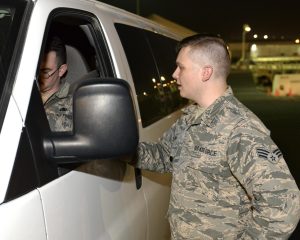
An Air Force Airfield Management Specialist will perform some if not all of the following during their tenure with the Air Force:
- Procure, maintain, and produce information on the safe operation of aircraft through the national and international airspace system. This information includes flight plans, Flight Information Publications, aeronautical charts and maps, Notice to Airmen (NOTAM), local airfield and navigational aid status, and weather information.
- Direct, assist, and provide aircrews with information and services to accomplish operational activities relating to airfield management and flight planning.
- Coordinate with base agencies to meet aircrew requirements for billeting, messing, refueling, transportation, and transient aircraft maintenance.
- Inspect airfields.
- Plan and coordinate airfield construction.
- Ensure a safe operating environment for personnel and aircraft operation.
- Perform mobile airfield management functions and activities for worldwide deployment of USAF aircraft.
- Perform and supervise airfield management activities.
- Coordinate with agencies such as air traffic control, civil engineers, and command post to ensure support of airfield management activities.
Airmen who are performing or have performed Airfield Management services on Air Force bases seem overwhelmingly satisfied with their experience(s):
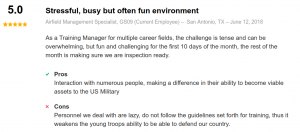



Duties of an Airfield Management Specialist also allow a ‘squared-away’ airmen to shine. When they do, people notice.
Recently Airmen First Class Scott Shoemaker was selected as the “Warrior of the Week” while serving as the Airfield Management Shift Supervisor at Al Dhafra Air Base, United Emirates while on deployment.
Airfield Manager Nathaniel L. Watts noticed the hard work of the shift supervisor.
“I feel Airman First Class Scott Shoemaker, is an outstanding worker! Scott’s ‘Warrior Of The Week’ award downrange is similar to multiple awards he receives at his home unit, back at Charleston.”
Watts added, “He knows his airfield well, and is trained to prepare for aircraft takeoffs and landings often on very short notice, and sometimes under adverse conditions, and oversee the safe operation of military aircraft through the national and international airspace systems.”
Civilian Career Opportunities
Civilian career opportunities abound for airmen who have served as Airfield Management Specialist. Wherever there is an airport, there is a job for someone who has experience in Airfield Management.
According to the CIA, the United States is home to about a third of airports worldwide. That number is approximately 15,095.
These jobs include airside operations specialist, airfield operations manager, operations center duty controller, airfield manager, airport operations coordinator, and a slew of others.
Related Article – How To Get Into The Air Force Academy
If you are considering joining the Air Force, are detailed oriented and like to ensure things are orderly and well regulated, a career as an Airfield Management Specialist might just be for you.
References
Air Force 21 Day Fitness Program
Official Air Force Career Webpage
- Ikon Pass Military Discount: Learn How To Save Big - January 31, 2025
- RTIC Military Discount: Find Out How To Save Big on Gear - January 30, 2025
- Traeger Military Discount: Learn How To Save Big on Smokers - January 28, 2025

